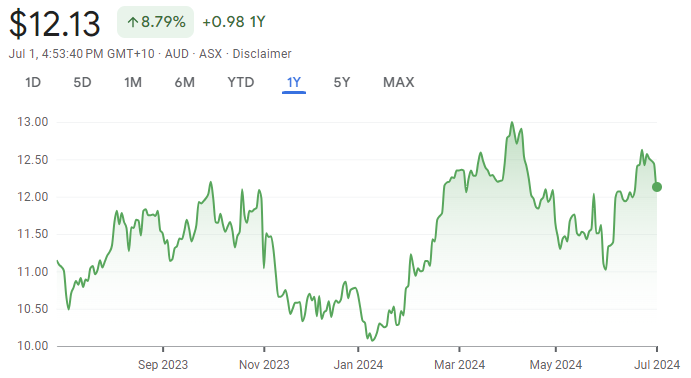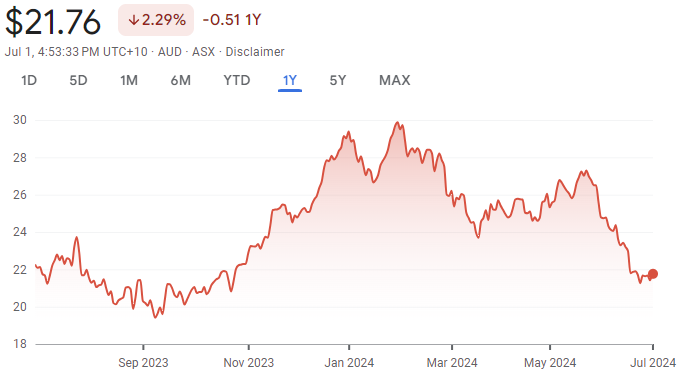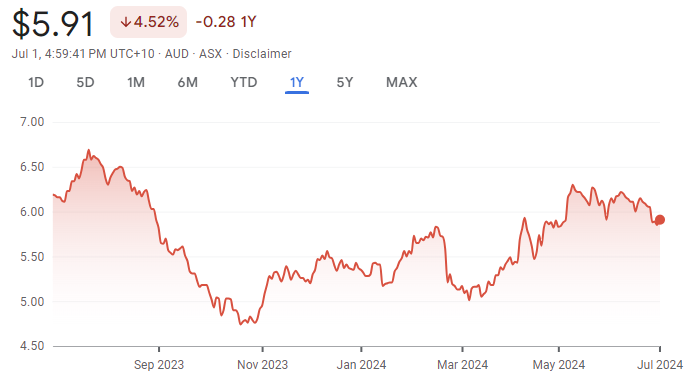China Australia Relations Are Thawing: Here are 4 Companies that will Benefit

China Australia Relations are on the mend – if you had any doubts, the recent arrival of Chinese Premier Li Qiang on Australian soil should have put them to bed. It was the first by a Chinese premier in nearly a decade, and it may very well signal a new era of cooperation between these two significant Pacific powers.
It has been barely 2 weeks, and we’ve seen Australians been given visa-free tourist access for 18 months. Certain tariffs, particularly on wine, were removed earlier this year. It represents a possible thaw in what was once a chilly relationship, hinting at a future where both nations are ready to bury old grievances and forge ahead. After a period characterised by tension and economic tug-of-wars, this could be the breath of fresh air needed to reinvigorate trade and trust.
China Australia Relations were poor for a while
The backstory to this visit is a rollercoaster of political drama and economic stakes. The relationship took a nosedive when Australia, advocating for global transparency, pushed for an independent inquiry into the origins of COVID-19. This move did not sit well with China, leading to a swift and stinging response—trade barriers targeting quintessential Australian exports like wine, barley, and coal. The economic backlash was palpable, with Australian businesses feeling the pinch of lost revenues and disrupted markets.
Moreover, Australia’s decision to exclude Huawei from its 5G network rollout added fuel to the fire, amplifying the discord and distrust. These were not mere policy decisions; they were statements loaded with geopolitical implications, testing the resilience and depth of bilateral engagements.
The stakes are high, and the benefits of a restored partnership could be substantial.
Since becoming Australia’s top trading partner in 2009, China has played an important role in the Australian economic climate. In 2023 alone – even with the infamous tariffs on barely, wine and beef in place – bilateral trade soared to an impressive A$219 billion. Australia’s bounty of natural resources, including iron ore, LNG, and coal, aligns perfectly with China’s robust industrial demands, making this partnership not just convenient but critical for both.
So now you must be wondering, which stocks are likely to benefit the most from this diplomatic play. And we have a list for you.
Treasury Wine Estates (ASX: TWE)
The improving China Australia relations are important for TWE. In 2019, Treasury Wine Estates was riding high, exporting around A$1.1 billion worth of wine to China. The Chinese middle class had developed a taste for Australian wine, and Treasury’s premium labels were highly sought after. But then, relations soured. China imposed tariffs as high as 200% on Australian wine, causing Treasury’s share of the Chinese market to plummet to a mere 0.14% by mid-2023. The company’s share price took a hit, leaving investors wary.

Enter Premier Li Qiang’s visit. Amidst the fanfare of diplomatic niceties, discussions turned to trade barriers. Li’s visit and the positive dialogues with Australian Prime Minister Anthony Albanese hinted at a potential easing of these punitive tariffs. For Treasury Wine Estates, this could mean a dramatic revival of its Chinese market.
The company’s strategic acquisition of US winemaker Daou is part of a broader diversification strategy, but the real growth catalyst lies in China. With the potential lifting of tariffs, Treasury Wine Estates could see its revenues soar. Analysts are bullish, with Shaw and Partners setting a target of $14 for the stock, up from $11.46. As China and Australia mend their economic ties, Treasury Wine Estates is positioned to regain its lost market and thrive.
Fortescue Metals (ASX: FMG)
Fortescue Metals, a titan in the mining industry, has long been a key player in supplying China with iron ore. In the first quarter of 2024 alone, iron ore exports to China were valued at A$19.2 billion, constituting 62% of Australia’s total exports to China. However, the recent geopolitical tensions had cast a shadow over this lucrative relationship.

During Premier Li Qiang’s visit, economic cooperation was a major topic. The emphasis on mutual benefits and the easing of diplomatic tensions bode well for Fortescue. Stability in the political landscape ensures a steady demand for iron ore, critical for China’s infrastructure and industrial sectors.
Fortescue’s strong operational performance and strategic positioning make it a prime candidate to benefit from the improved relations. As China ramps up its infrastructure projects post-pandemic, the demand for iron ore is expected to surge. Fortescue, with its established supply chains and robust production capabilities, is set to capitalize on this demand, promising substantial returns for investors.
Qantas (ASX: QAN)
The COVID-19 pandemic dealt a severe blow to Qantas, with international travel grinding to a halt. Chinese tourists, who were Australia’s largest international tourist group in 2019, had significantly dwindled. By April 2023, short-term visitors from China were still only 60% of pre-pandemic levels.

Now, we do concede that Qantas may not benefit as much as it would have if it was not suspending Shanghai-Sydney flights, which it will be doing at the end of July. But it still runs flights out of Hong Kong and has partnerships with fellow oneworld member Cathay Pacific as well as China Eastern. And if Chinese tourists come back to Australia and need to fly domestically, Qantas will be well poised to capture a substantial share of them.
Bubs (ASX:BUB)
So many infant formula stocks like Bubs were hit hard by the diplomatic spat. The reliance on daigou channels and direct exports meant that the trade barriers imposed by China led to a sharp decline in sales. The company’s market presence in China, once a stronghold, was severely compromised. We are singling out Bubs here because it is one of the most prominant and sought in recent years to diversify into neighbouring markets like Vietnam.
For Bubs, the normalization of relations is a golden opportunity. The Chinese market’s appetite for premium international dairy products remains strong. With the easing of trade restrictions, the company can leverage its brand equity and product differentiation to capture market share.
A Vital Partnership
Australia’s wealth in critical minerals like lithium and rare earth elements is not just a national treasure; it’s essential for technological growth worldwide. During Premier Li Qiang’s visit, the focus on these resources shone a light on their crucial role in renewable energy. Given China’s tech smarts and financial muscle, partnering with Australia could really boost its refining processes and help build a solid renewable energy sector. This could set Australia up as a leader in clean energy, making the most of its rich resources.
Complex Global Politics
The relationship between China and Australia is deeply tied to broader global politics, especially with the United States playing a big part as Australia’s ally. The U.S. is trying to limit China’s reach by forming tight groups with other nations, which makes Australia’s position quite tricky. It’s going to take a lot of smart diplomacy for Australia to manage these powerful alliances without harming its own growth and stability.
Challenges and Opportunities Ahead
Though Premier Li’s visit has warmed up relations between China and Australia, there are still plenty of challenges that could throw a spanner in the works. Issues like human rights, regional tensions, and political differences within both countries could disrupt this growing partnership. However, the potential economic and technological benefits are too good to pass up. Both nations have strong reasons to keep working through these problems to keep their relationship on track.
A New Era of Economic Growth
The improvement in China Australia relations is a big deal. Companies like Treasury Wine Estates, Fortescue Metals, Qantas, and Bubs are in a great position to benefit from this renewed cooperation. They’re likely to see a boost from easier trade and more collaboration, making them attractive options for investors looking to take advantage of the positive momentum.
This isn’t just about moving past old disagreements but about grabbing the opportunities that come from working towards common goals. For investors, now seems like the perfect time to look at these companies that are set to do well as both countries continue to strengthen their ties. The story here is one of hope and opportunity, with a promising outlook for those ready to jump on these new developments.
What are the Best ASX Stocks to invest in right now?
Check our buy/sell tips

Blog Categories
Get Our Top 5 ASX Stocks for FY26
Recent Posts
The Metals Driving Australia’s Market in 2026
Australia will still be a metals market in 2026; that part is not up for debate. What is changing is…
Patagonia Lithium (ASX:PL3) Surges 53% on Ameerex Partnership: Is This Lithium Explorer a Buy?
Patagonia Lithium Secures Key Partnerships for Growth Patagonia Lithium (ASX: PL3) surged 53% to A$0.13 on Friday, hitting its highest…
Aristocrat Leisure (ASX:ALL) Extends $750m Buyback: Time to Buy Australia’s Gaming Giant?
Aristocrat Leisure: A Compelling Investment Opportunity Aristocrat Leisure (ASX: ALL) rose 1.01% to A$57.22 on Friday after announcing a A$750…


